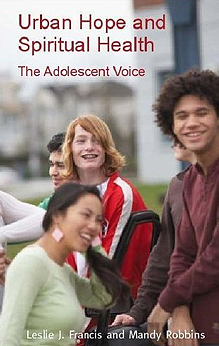
Author: Leslie J. Francis, Mandy Robbins,
Genre: Christian life
Publisher: Epworth Press
Release Date: 28 Dec 2005
Format: Paperback
Pages: 280
Source: No longer available on the website
Professor Leslie Francis, Director of the Welsh National Centre for Religious Education, has pioneered the concept of ’empirical theology’ and in particular a quantitative measure of ‘spiritual health’: “Spiritual health involves the whole person. Spiritually healthy individuals stand in right relationship with themselves, with other people, with the world in which they live, and with the transcendent, however they conceive it. Spiritually healthy individuals build purposeful lives, develop sound relationships, take responsibility for the world around them, and embrace the transcendent with confidence. Spiritually healthy individuals are needed at the heart of urban regeneration, to celebrate personal hope, to invest in social capital and to transform spiritual wilderness into centres of personal, social and economic creativity”.
This book is based on an analysis of over 34,000 13- to 15-year old pupils in England and Wales, including 500 Muslims. It finds that “there are significant ways in which young people affiliated with the Islamic tradition enjoy higher levels of spiritual health in comparison with young people who belong to no religious tradition…in the environmental domain young Islamic affiliates display greater concern for world development issues…in the personal domain [they] express a greater sense of purpose in life…. there are however significant warning signs…they are more likely to experience low self-esteem and much more likely to be worried about being bullied at school…these findings demonstrate the significant contribution to urban hope which can be generated by the good spiritual health nurtured within the Islamic community”.
‘Urban Hope and Spiritual Health’ includes chapters on pupils in various types of Christian denominational schools, and also on young persons in the Jewish, Hindu and Sikh faith communities. Professor Francis’s work ought to be replicated and extended in a larger scale study of Muslim adolescents, perhaps focussing on issues such as the different results obtained for boys and girls, the effect of the Islamic calendar – would surveys taken in Ramadan different from other times of the year? It would also be important to investigate differences in ‘spiritual health’ between young persons in independent Muslim schools and other schools.
